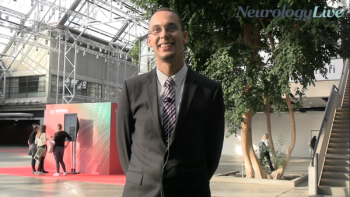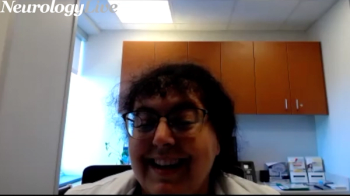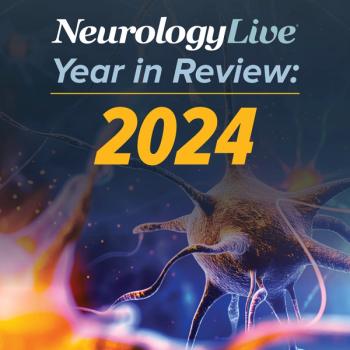
Results from the open-label phase 1/2 study of tividenofusp alfa demonstrated positive effects on evidence-based surrogate end points in participants with Hunter syndrome.

Results from the open-label phase 1/2 study of tividenofusp alfa demonstrated positive effects on evidence-based surrogate end points in participants with Hunter syndrome.

Masoud Toloue, chief executive officer at Quanterix, and Nicholas J. Ashton, PhD, senior director of the Banner Health Fluid Biomarker Program, discussed the Simoa technology required to test for p-tau217, the expanding understanding of this biomarker, and the next steps for advancing this research.

The primary audience for the new appropriate use criteria is dementia specialists who dedicate a substantial portion of their clinical practice to treating patients with cognitive concerns.

Posdinemab, a monoclonal antibody that targets the mid-domain of Alzheimer disease-specific phosphorylated tau, is currently being investigated in a placebo-controlled phase 2b trial that employs a plasma biomarker as a screening tool.

The revised protocol merges the 6-month symptomatic and 18-month disease-modifying studies into a single trial with a 6-month symptomatic readout and a 12-month disease-modifying evaluation.

In a recent analysis, BrainCheck Access showed a high degree of alignment with the Montreal Cognitive Assessment in differentiating normal cognition, mild cognitive impairment, and dementia.

SGT-212 delivers full-length frataxin via MRI-guided intradentate nucleus infusion and intravenous administration to target mitochondrial dysfunction in neurons and cardiomyocytes, addressing both neurologic and cardiac symptoms.

The senior vice president of research at The ALS Association provided commentary on recently published research that found specialists to diagnose ALS twice as fast as general neurologists. [WATCH TIME: 4 minutes]

The global Phase 3 trial aims to enroll ~150 patients with Dravet syndrome who have SCN1A variants, assessing zorevunersen's impact on seizure frequency, behavior, cognition, and safety over 60 weeks, with results expected by 2027.

The professor in the department of clinical pharmacy and neurology at the University of Colorado reflected on the significance of peer recognition, the evolution of MS clinics, and the importance of staying engaged in professional contributions. [WATCH TIME: 6 minutes]

The director of the Corinne Goldsmith Dickinson Center for MS at Mount Sinai talked about how modern advances research have helped transition the understanding of multiple sclerosis from fixed phenotypes to a dynamic spectrum.

Lekha Rao, MD, an epileptologist at UCLA Health, discussed the challenges in diagnosing D/EE-SWAS, the importance of early EEG, and the need for greater awareness around this rare and complex epileptic condition.

Despite not meeting its primary and key secondary end points, an exploratory high dose cohort of fosigotifator demonstrated promising results on end points of muscle strength.

The postdoctoral research assistant at Charité University Berlin discussed advances in diagnostic criteria and 7-Tesla MRI imaging, highlighting a previously overlooked overlap between anti-N-methyl-D-aspartate receptor encephalitis and multiple sclerosis. [WATCH TIME: 5 minutes]

Over a 24-week period, DNL343 failed to distinguish itself from placebo on the primary end point of ALSFRS-R, as well as on other secondary end points of muscle strength and respiratory function.

Babitha Haridas, MD, MBBS, a pediatric epileptologist at Johns Hopkins Medicine, discussed the complexities with managing status epilepticus in Lennox-Gastaut syndrome, focusing on the importance of identifying triggers early in their condition.

The Delphi-MD platform is designed for nerve stimulation in diagnostic applications, offering clinicians a tool to support objective and personalized treatment approaches in brain health.

Most participants showed improvements in motor function, with 61% achieving a clinically meaningful increase in HFMSE scores by week 52 and 41% achieving similar gains in RULM scores.

The neurologist and sleep disorder specialist at Allegheny Health Network provided an in-depth exploration of the current advancements and future directions in narcolepsy drug development. [WATCH TIME: 3 minutes]

The ACCORD-2 trial demonstrated a significant reduction in overall worsening compared to placebo, while the ADVANCE-2 trial showed numerically greater improvements without reaching statistical significance.

Results from Vigil Neuroscience’s ongoing phase 1 trial of VG-3927 in healthy volunteers supported the continued development of the therapy as a potential once-daily oral treatment for Alzheimer disease.

Here's some of what is coming soon to NeurologyLive® this week.

Ultimately, the biomarkers' temporal patterns may help differentiate attacks from remission, with sGFAP being particularly useful in distinguishing genuine attacks from pseudoattacks.

Catch up on any of the neurology news headlines you may have missed over the course of December 2024, compiled all into one place by the NeurologyLive® team.

Test your neurology knowledge with NeurologyLive®'s weekly quiz series, featuring questions on a variety of clinical and historical neurology topics. This week's topic is on vascular dementia.

As part of NeurologyLive®'s Year in Review, we've compiled the most-watched expert-led video series that appeared on the website in 2024.

David Lynch, MD, PhD, a professor of neurology at the University of Pennsylvania Perelman School of Medicine, discussed the significance of a number of recently presented analyses highlighting omaveloxlone, the first approved therapy for Friedreich ataxia.

Neurology News Network. for the week ending January 4, 2025. [WATCH TIME: 4 minutes]

Take 5 minutes to catch up on NeurologyLive®'s highlights from the week ending January 3, 2024.

A feature on NeurologyLive®, IJMSC Insights offers a look at the data around employment among people with MS.